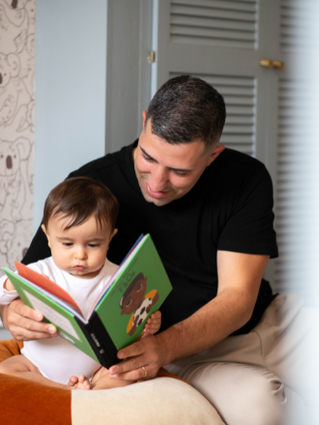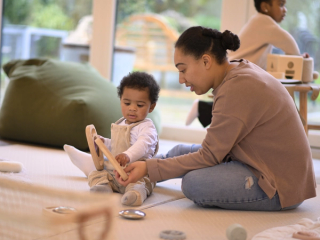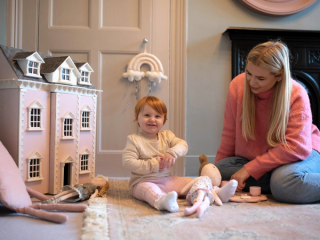
- Home
- Advice Hub
- Baby
- Bonding & Development
- What Is Speech Therapy And How It Works
A Parent’s Guide to Speech Therapy
Learn what speech therapy is, how it works, and how parents can support their child’s speech and language development through early intervention and care.
As a parent, watching your child’s speech and language journey is exciting and rewarding. Children develop communication skills at their own pace, and differences are natural. If you notice your child needs support with vocabulary, pronunciation or engaging in early conversations, early intervention can make a meaningful difference. This guide explains what speech therapy is, how it works and how parents can actively nurture their child’s speech and language development at home.
What is Speech Therapy?
Speech therapy is a supportive, child-centred approach that helps children develop their communication skills, including:
- Speech: Producing sounds clearly in words and sentences.
- Language: Understanding and using words, sentences, grammar and concepts to communicate.
- Social communication: Navigating social situations and participating in two-way interactions.
- Feeding and swallowing skills: Supporting oral motor skills for eating and drinking.
- Early literacy foundations: Building language patterns, sounds, and vocabulary for reading and writing.
Speech therapy is delivered by licensed speech and language therapists (SLTs) professionals trained to assess children’s speech, language and communication skills, set personalised goals, and work alongside families to encourage communication in everyday life. In some regions, this may be called speech pathology treatment, but the approach is the same: supporting speech, language, and communication skills.
Why Children Might Benefit from Speech Therapy
Every child’s development is unique. Families and professionals may seek support for reasons such as:
- Variations in speech and language milestones: Some children take longer to coo, babble, or form first words.
- Difficulty forming sounds: Mispronunciations or unclear speech can affect communication.
- Stuttering or fluency differences
- Neurodivergent communication styles: For example, speech therapy can support autistic children in building their communication skills, social interaction, and expressive language, while respecting and developing their individual strengths and ways of interacting.
- Hearing differences or recurrent ear infections
- Tongue-tie or oral motor challenges
Needing support does not mean there is anything “wrong” with your child. Early intervention gives children the best chance to thrive in communication, learning, and social confidence. Speech therapy for toddlers can support vocabulary growth, early phrases, and social communication skills, while guiding parents on ways to reinforce language at home.
Early Speech and Language Milestones
Being aware of typical milestones can help you monitor your child’s progress, but remember that every child develops at their own pace. Variations are common. If you have concerns, discuss your observations with your child’s GP or Health Visitor. Early support can make a significant difference.
- 0-3 months: Cooing, making eye contact, responding to voices
- 4-6 months: Imitating sounds, understanding routines and simple words, some first words
- 7-12 months: Imitating sounds, understanding routines and simple words, some first words
- 12-18 months: Vocabulary of 20–50 words, using gestures, following simple instructions
- 18-24 months: Vocabulary increases, using two-word phrases, understanding more
- 2-3 years: Simple sentences, asking questions, following multi-step instructions
How Speech Therapy Works
Speech therapy sessions are fun, interactive, and tailored to each child. They typically include:
- Assessment: The therapist observes your child’s speech, language, and social communication skills. They may use standardised tests, play-based observations, and parent questionnaires.
- Goal Setting: Based on the assessment, the SLT creates achievable, individualised goals for your child.
- Play-Based Activities: Therapy often takes place through games, songs, stories, and interactive play.
- Parent Collaboration: SLTs work closely with parents, teaching strategies and exercises to use at home, to reinforce skills throughout the day.
Where Speech Therapy Takes Place
Therapy is flexible and can happen in clinics, early years centres, hospitals, community health services, or at home. The goal is always to provide support in a comfortable, familiar environment with parents as active partners in their child’s progress.
Benefits of Early Support
Early intervention offers many benefits:
- Improved confidence in speaking and social interaction
- Reduced frustration and behavioural challenges linked to communication differences
- Enhanced learning and readiness for school
- Support for emotional expression and regulation
Creating a positive, nurturing environment where your child receives encouragement, responsive interaction, and healthy nutrition helps all areas of development flourish.
How Parents Can Support Speech at Home
Parents play a crucial role in supporting speech and language development. Here are some practical tips:
- Talk Often: Narrate daily activities and discuss your child’s interests to build vocabulary.
- Be Responsive: Respond to your child’s communication (including non-verbal attempts such as gestures), using short, simple phrases and actions.
- Read Together: Share age-appropriate books, focusing on early vocabulary, rhythm and connection.
- Use Everyday Opportunities: Model words and phrases during routines like bathtime, mealtimes and going to the shops.
- Reduce Screen Time: Prioritise face-to-face interactions and play over passive screen use.
- Model Language: Repeat and expand on your child’s words, for example:
- Child: “Car!”
- Parent: “Yes! A red car!”
- Praise Effort: Celebrate all attempts at communication, not just perfect pronunciation.
- Trust Your Instincts: If you have concerns, reach out to your child’s Health Visitor, GP, or a qualified SLT for guidance.
Conclusion
Every child communicates in their own way, whether through words, gestures, or other methods such as sign language or alternative communication devices. Speech therapy provides supportive, evidence-based guidance to help children develop speech, language, and social communication skills. Early intervention, nurturing care, responsive play, and healthy nourishment all contribute to communication success. If you have concerns about your child’s speech or language development, reach out to a healthcare professional. Speech therapy supports each child’s unique way of interacting and expressing themselves, and the right support, early and consistently applied, can make a meaningful difference in your child’s confidence, learning, and ability to connect with others.
FAQs about speech therapy
Speech therapy can start at any age. Early intervention, even in infancy, helps children develop foundational communication skills.
Look for delays in babbling, first words, or understanding language, persistent difficulty forming sounds, or frustration communicating. An SLT can provide guidance.
Sessions involve assessment, goal setting, play-based activities, and parent collaboration. They are child-centred and often fun.
Progress varies depending on the child’s needs, age, and frequency of practice at home. Many children show some improvements in just a few sessions!
Excessive passive screen time may reduce opportunities for interaction and language practice. Face-to-face engagement is far more beneficial for communication development.












